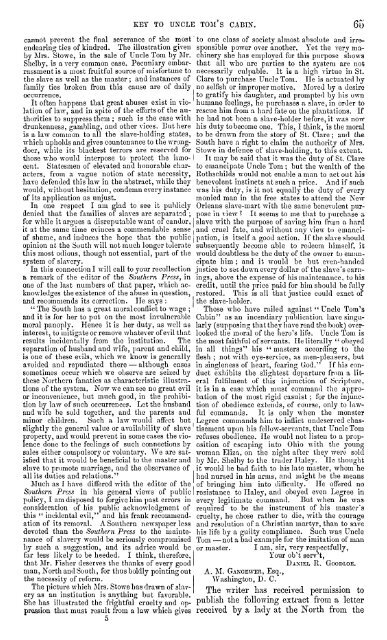UNCLE TOM'S CABIN
1iw97FV
1iw97FV
- No tags were found...
You also want an ePaper? Increase the reach of your titles
YUMPU automatically turns print PDFs into web optimized ePapers that Google loves.
although<br />
not<br />
KEY TO <strong>UNCLE</strong> TOM S <strong>CABIN</strong>.<br />
68<br />
cannot preventthe final severance of the most<br />
endearing ties of kindred. The illustration given<br />
by Mrs. Stowe, in the sale of Uncle Tom by Mr.<br />
Shelby, is a very<br />
common case. Pecuniaryembarrassment<br />
that all who are parties to the system are not<br />
is a most fruitful source of misfortune to<br />
necessarily culpable Ịt is a highvirtue in St.<br />
the slave as well as the master ; and instances of Clare to purchaseUncle Tom. He is actuated by<br />
family ties broken from this cause are of dailyno selfish or impropermotive. Moved by a desire<br />
occurrence.<br />
to gratify his daughter, and promptedby his own<br />
It oftenhappens that great abuses exist in violation<br />
humane feelings, liepurchasesa slave,in order to<br />
of law,and<br />
thorities rescue him from a hard fate on the plantations. If<br />
in spiteof the efFortsofthe au-<br />
such is the case with<br />
to suppress them ;<br />
drunkenness,gambling, and other vices. But here<br />
states,<br />
is a law common to all the slave-holding<br />
which upholds and gives countenance to the wrongdoer,<br />
while its blackest terrors are reserved for<br />
those who would interpose to protectthe innocent.<br />
It may be said that it was the dutyof St.Clare<br />
Statesmen of elevated and honorable characters,<br />
to emancipate Uncle Tom ; but the wealth of the<br />
from a vague<br />
notion of state necessity, Rothschilds would not enable a man to act out his<br />
have defended this law in the abstract, while they benevolent instinctsat such a price. And if such<br />
would, without hesitation, condemn every instance was his duty, is it not equallythe duty of every<br />
of its application as unjust.<br />
monied man in the free states to attend the New<br />
In one respect I am glad to see it publicly Orleans slave-mart with the same benevolent purpose<br />
denied that the familiesof slaves are separated ; in view 1 It seems to me that to purchasea<br />
for while it argues<br />
a disreputable want of*candor, j slave with the purpose of savinghim from a hard<br />
it at the same time evinces a commendable sense and<br />
of shame,and induces the hope that the I cruel fate,and without any view to emancijpation,<br />
is itselfa goodaction. If the slaveshould<br />
public<br />
opinion at the South will not much longertolerate subsequently become able to redeem himself,it<br />
this most odious,though not essential, partof the would doubtlessbe the dutyof the owner to emancipate<br />
system of slavery.<br />
him ; and it would be but even-handed<br />
In this connection I will call to your recollection justiceto sec down every dollar of the slave's earnings,<br />
a remark of the editorof the Southern Press,in above the expense of his maintenancețo his<br />
one of the last numbers of that paper,<br />
which acknowledges<br />
credit,until the pricepaidfor him should be fully<br />
the existenceof the abuse in question, restored. This is all that justicecould exact of<br />
and recommends its correction. He says<br />
:<br />
the slave-holder.<br />
"<br />
The South has a great moral conflic to wage ; Those who have railed against<br />
" Uncle Tom's<br />
and it is for her to put<br />
on the most invulnerable Cabin" as an incendiary publication have singularly<br />
moral panoply. Hence it is her duty, as well as (supposing that they have read the book)overlooked<br />
interest, to mitigate or remove whatever of evilthat<br />
the moral of the hero's life. Uncle Tom is<br />
"<br />
results incidentally from the institution. The the most faithfulof servants. He literally obeyed<br />
separation of husband and wife,parent and child, in all things"his " masters according to the<br />
is one of these evils, which we know is generally flesh ; not with eye-service, as men-pleasers, but<br />
avoided and repudiated there cases<br />
"<br />
in singleness of heart,fearingGod." If his conduct<br />
sometimes occur which we observe are seizedby exhibits the slightestdeparture from a literal<br />
fulfilment of this injunction of Scripture,<br />
these Northern fanaticsas characteristicillustrations<br />
of the system. Now we can see no great evil it is in a case which must command the approbation<br />
or inconvenience, but much good, in the prohibition<br />
of the most rigidcasuist ; for the injunction<br />
by law of such occurrences. Let the husband of obedience extends,of course, onlyto lawful<br />
and wife be sold together, and the parents and commands. It is only when the monster<br />
minor children. Such a law would affect but Legreecommands him to inflictundeserved chastisement<br />
slightly the generalvalue or availability of slave<br />
upon his fellow-servants, that Uncle Tom<br />
and would preventin some cases the vioence<br />
done to the feelings of such connections by<br />
of escaping into Ohio with the young<br />
refuses obedience. He would not listen to a<br />
proposition<br />
ftroperty,<br />
saleseither compulsory or voluntary. We are satisfied<br />
woman Eliza,on the night after theywere sold<br />
that it would be beneficialto the master and by Mr. Shelby to the trader Haley. He thought<br />
slave to promotemarriage, and the observance of it would be bad faithto his late master,whom he<br />
all its duties and relations."<br />
had nursed in his arms, and mightbe the means<br />
Much as I have differed with the editorof the of bringing him into difficulty. He offered no<br />
Southern Press in his generalviews of publicresistance to Haley,and obeyed even Legree in<br />
policy, I am disposed to forgive him pasterrors in<br />
every legitimate command. But when he wasrequiredto<br />
be the instrument of his master's<br />
consideration of his publicacknowledgment of<br />
this " incidentalevil,"and his frank recommendation<br />
cruelty, he chose rather to die,with the courage<br />
of its removal. A Southern newspaper less and resolutionof a Christian martyr, than to save<br />
devoted than the Southern Press to the maintenance<br />
his lifeby a guiltycompliance.Such was Uncle<br />
of slavery would be "<br />
seriously compromisedTom a bad examplefor the imitation of man<br />
by such a suggestion, and its advice would be or master. I am, sir, very respectfully,<br />
far less likely to be heeded. I think,therefore,<br />
Your ob't serv't,<br />
that Mr. Fisher deserves the thanks of every good<br />
Damel R. Goodloe.<br />
man, North and South,for thus boldlypointing out A. M. Gangewer, Esq.,<br />
the necessity of reform.<br />
Washington, D. C.<br />
The picture which Mrs. Stowe has drawn of slavery<br />
The writer has received permission to<br />
as an institution is anythingbut favorable.<br />
She has illustrated the frightful cruelty and publish the following extract from a letter<br />
oppression<br />
that must resultfrom a law which gives<br />
5<br />
to one class of society<br />
almost absolute and<br />
irresponsible<br />
power over another. Yet the very machinery<br />
she has employed for this purpose shows<br />
he had not been a slave-holderbefore, it was now<br />
his dutyto become one. This,I think,is the moral<br />
to be drawn from the story of St. Clare ; and the<br />
South have a righ to claim the authorityof Mrs.<br />
Stowe<br />
in defence of slave-holding, to this extent.<br />
received by a ladyat the North from the




